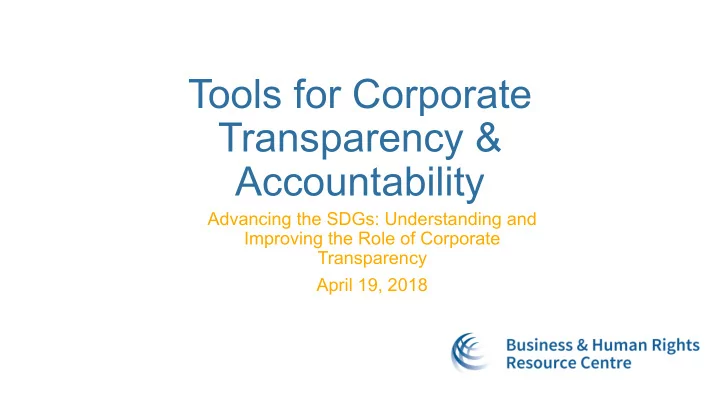

Tools for Corporate Transparency & Accountability Advancing the SDGs: Understanding and Improving the Role of Corporate Transparency April 19, 2018
The Resource Centre’s mission • We seek to build corporate transparency, strengthen accountability, and empower advocates for human rights in civil society, media, companies, investors, and governments. • Our 19 Regional Researchers – located all over the world – work with local communities to understand the impacts of business on the ground, and regularly engage with stakeholders from all sectors.
www. business-humanrights .org • Our website is the only global business and human rights knowledge hub, delivering up-to-date and comprehensive news in eight languages. We receive over 235,000 visits to the site every month. • We track the human rights policy and performance of over 7000 companies in over 180 countries, making this information publicly available. • We take up alleged abuse quickly and directly with companies. We’ve made over 2400 approaches to companies asking them to respond to specific human rights allegations. Our global response rate is 75%. • Our free Weekly Update e-newsletter has over 18,000 subscribers around the world, including advocates, activists, businesspeople, governments, and investors. • We release briefings and analysis, including rankings, synthesizing the work of hundreds of advocates across the world and make recommendations for companies, governments, regions and sectors.
Companies & SDGs • Businesses are critical to achieving the SDGs. We need industry leadership, government regulation & civil society activism if they are to deliver for people and planet, as well as for profit • This must include the company’s contribution to their work sector, but the way they do business, including within their own supply chains: respect for workers’ rights & shared prosperity (modern slavery, workplace health & safety, living wage, freedom of association) • Our recent survey of the largest companies’ compliance statements for the UK Modern Slavery Act showed that 69% score four out of ten or below. Almost half did not meet the minimum standards of the Act. • Most people working in the world would benefit from the SDGs if companies transformed business models to provide decent work and a living wage in their operations and supply chains. This is not easy, but it’s also not rocket science. • See also: SDGs – the New Fitbit? by Conniel Malek, Director, True Costs Initiative
For example: A Fast and Fair Transition • Allegations of human rights abuses associated with renewable energy projects are increasing: 115 allegations of human rights abuse since 2005, with 91 since 2010 • Communities in Central & South America & Asia raising most allegations: More than 50% of allegations were related to projects in Central & South America, 28% in Asia • We reached out to 50 wind and hydropower companies: • 33 companies have a human rights policy, but only half refer to international standards • 34 companies have some commitment to consult with local communities. Only 5 companies referred to the international standard of FPIC (3/5 faced allegations from communities). • Half of the wind energy companies do not have a commitment to consult with local communities
Recommend
More recommend